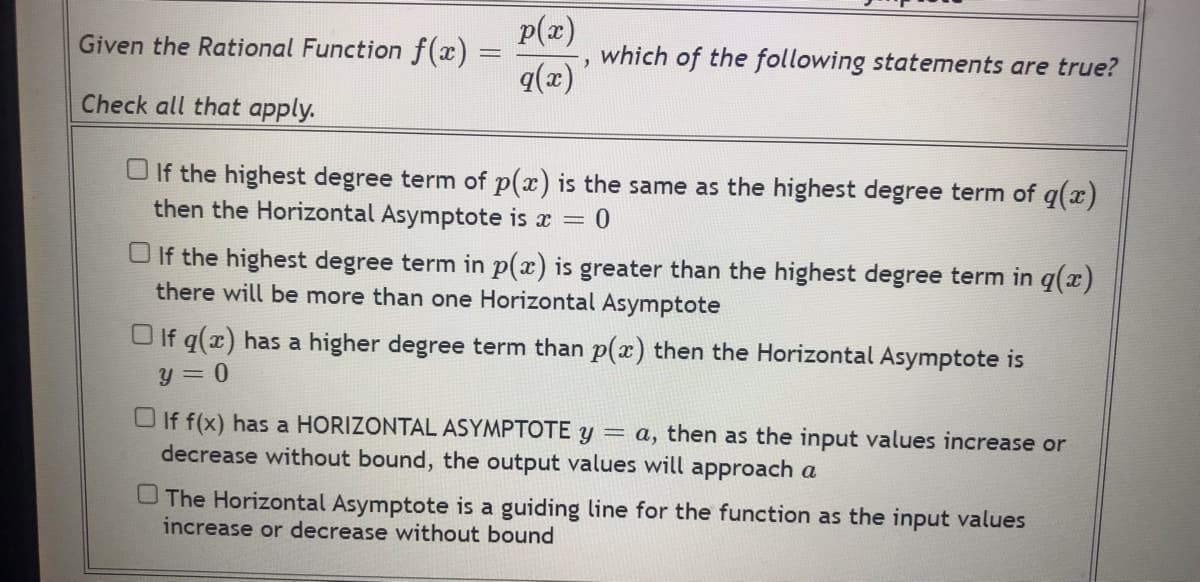Given the Rational Function f(x) = Check all that apply. p(x) which of the following statements are true? q(x) ' If the highest degree term of p(x) is the same as the highest degree term of g(x) then the Horizontal Asymptote is x = 0 If the highest degree term in p(x) is greater than the highest degree term in g(x) there will be more than one Horizontal Asymptote If q(x) has a higher degree term than p(x) then the Horizontal Asymptote is y=0 If f(x) has a HORIZONTAL ASYMPTOTE y = a, then as the input values increase or decrease without bound, the output values will approach a The Horizontal Asymptote is a guiding line for the function as the input values increase or decrease without bound
Given the Rational Function f(x) = Check all that apply. p(x) which of the following statements are true? q(x) ' If the highest degree term of p(x) is the same as the highest degree term of g(x) then the Horizontal Asymptote is x = 0 If the highest degree term in p(x) is greater than the highest degree term in g(x) there will be more than one Horizontal Asymptote If q(x) has a higher degree term than p(x) then the Horizontal Asymptote is y=0 If f(x) has a HORIZONTAL ASYMPTOTE y = a, then as the input values increase or decrease without bound, the output values will approach a The Horizontal Asymptote is a guiding line for the function as the input values increase or decrease without bound
College Algebra
7th Edition
ISBN:9781305115545
Author:James Stewart, Lothar Redlin, Saleem Watson
Publisher:James Stewart, Lothar Redlin, Saleem Watson
Chapter3: Polynomial And Rational Functions
Section: Chapter Questions
Problem 11T: Consider the following rational functions: r(x)=x2x22x1 s(x)=x2+4x3+27 t(x)=x+2x39x u(x)=x225x2+x6...
Related questions
Question

Transcribed Image Text:Given the Rational Function f(x) =
Check all that apply.
p(x)
which of the following statements are true?
q(x) '
If the highest degree term of p(x) is the same as the highest degree term of g(x)
then the Horizontal Asymptote is x = 0
If the highest degree term in p(x) is greater than the highest degree term in g(x)
there will be more than one Horizontal Asymptote
If q(x) has a higher degree term than p(x) then the Horizontal Asymptote is
y=0
If f(x) has a HORIZONTAL ASYMPTOTE y = a, then as the input values increase or
decrease without bound, the output values will approach a
The Horizontal Asymptote is a guiding line for the function as the input values
increase or decrease without bound
Expert Solution
This question has been solved!
Explore an expertly crafted, step-by-step solution for a thorough understanding of key concepts.
This is a popular solution!
Trending now
This is a popular solution!
Step by step
Solved in 2 steps with 1 images

Recommended textbooks for you

College Algebra
Algebra
ISBN:
9781305115545
Author:
James Stewart, Lothar Redlin, Saleem Watson
Publisher:
Cengage Learning

Algebra and Trigonometry (MindTap Course List)
Algebra
ISBN:
9781305071742
Author:
James Stewart, Lothar Redlin, Saleem Watson
Publisher:
Cengage Learning

Algebra for College Students
Algebra
ISBN:
9781285195780
Author:
Jerome E. Kaufmann, Karen L. Schwitters
Publisher:
Cengage Learning

College Algebra
Algebra
ISBN:
9781305115545
Author:
James Stewart, Lothar Redlin, Saleem Watson
Publisher:
Cengage Learning

Algebra and Trigonometry (MindTap Course List)
Algebra
ISBN:
9781305071742
Author:
James Stewart, Lothar Redlin, Saleem Watson
Publisher:
Cengage Learning

Algebra for College Students
Algebra
ISBN:
9781285195780
Author:
Jerome E. Kaufmann, Karen L. Schwitters
Publisher:
Cengage Learning


Functions and Change: A Modeling Approach to Coll…
Algebra
ISBN:
9781337111348
Author:
Bruce Crauder, Benny Evans, Alan Noell
Publisher:
Cengage Learning

Algebra & Trigonometry with Analytic Geometry
Algebra
ISBN:
9781133382119
Author:
Swokowski
Publisher:
Cengage